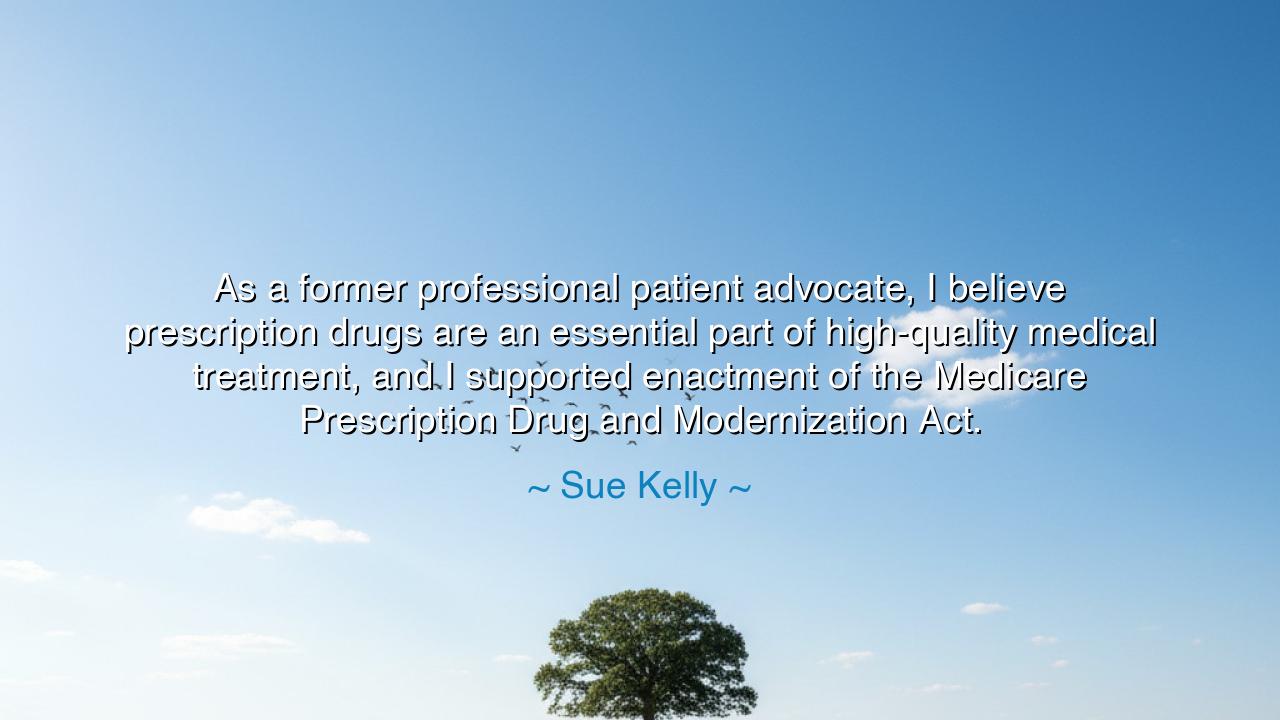
As a former professional patient advocate, I believe prescription
As a former professional patient advocate, I believe prescription drugs are an essential part of high-quality medical treatment, and I supported enactment of the Medicare Prescription Drug and Modernization Act.






Hearken, O seekers of wisdom and guardians of life, to the words of Sue Kelly, who proclaimed: "As a former professional patient advocate, I believe prescription drugs are an essential part of high-quality medical treatment, and I supported enactment of the Medicare Prescription Drug and Modernization Act." Within these words lies a profound reflection on duty, care, and the pursuit of health, reminding us that the well-being of the body is intertwined with the structures and knowledge that guide its healing. Prescription drugs, in this vision, are not mere commodities, but instruments of life and relief, wielded with discernment and compassion.
Since the earliest days, healers have sought remedies to ease suffering, from the herbalists of Mesopotamia to the physicians of ancient Egypt. They recognized that human life is fragile, and that knowledge, when applied wisely, can restore balance and vitality. Sue Kelly’s advocacy resonates with this timeless pursuit: to ensure that those who suffer have access to the tools necessary for their care, and that medicine fulfills its highest purpose—to alleviate pain and prolong life.
Consider the story of Sir Alexander Fleming, whose discovery of penicillin transformed the landscape of medicine. Before his insight, countless lives were lost to infections that are now easily treated. His work, like Kelly’s advocacy, exemplifies the principle that access to effective medicines can alter the destiny of individuals and communities alike. It is not enough to know what heals; society must ensure that these remedies are available to those in need.
The enactment of the Medicare Prescription Drug and Modernization Act reflects this commitment on a grand scale. By making medications accessible to millions of Americans, it acknowledges that healing is not merely an act of the physician, but a responsibility of the collective, a moral and societal duty to protect the vulnerable. Kelly’s support of this legislation embodies the ancient understanding that justice and compassion extend to the care of the sick, that a civilization is measured by how it treats its infirm.
In history, we see the consequences of neglecting such responsibility. During the Black Death in Europe, the lack of access to knowledge and remedies caused untold suffering. Where healers and communities collaborated, seeking every avenue to mitigate disease, survival increased. The lesson is clear: systems of care and the provision of medicine are as vital to human flourishing as courage and wisdom themselves.
Sue Kelly’s words also illuminate a deeper truth: advocacy is itself an act of moral courage. To champion access to medicines, to navigate the complexities of policy and regulation, is to align action with the principle that health is a right, not a privilege. It reminds us that the work of the healer is not confined to the clinic or the laboratory, but extends into the realms of law, policy, and society.
From this wisdom flows practical action: support systems that expand access to life-saving treatments, educate oneself and others about the value and proper use of medicines, and advocate for fairness and equity in healthcare. Recognize that each prescription, each policy, and each act of advocacy can ripple across countless lives, shaping health and hope for generations.
O seeker of understanding, remember this: the strength of a society is measured not by wealth or power alone, but by its commitment to healing, care, and justice. Let the words of Sue Kelly guide you, inspiring you to act with wisdom, courage, and compassion, ensuring that the tools of medicine are not hoarded or denied, but shared in service of life itself. In this way, advocacy becomes sacred, and access to healing becomes a reflection of our highest human ideals.
I can also craft a narrated-style version, with rhythmic rises and pauses, designed to be compelling when read aloud like an ancient moral teaching. Would you like me to do that?






AAdministratorAdministrator
Welcome, honored guests. Please leave a comment, we will respond soon